Panels To Prose: From the Book Store To The Comic Store
Oct 09, 2016
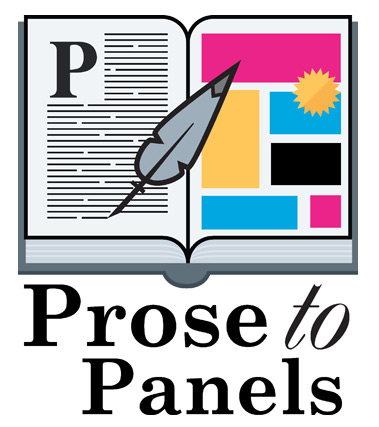
PREVIEWSworld once again celebrates mainstream authors whose works have come to Comic Shops in the form of serialized comics or graphic novels, either based on their previously published novels or new material written especially for the comics. Whether it an adaptation or all-new material, these writers are blurring the line between PROSE and PANELS, and bring with them fresh new ideas and characters for comics readers everywhere! In honor of this month’s PROSE to PANELS event, we reached out to several authors whose works have made the transition from prose to comics!
BRAD MELTZER
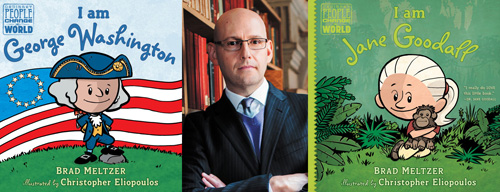 |
AUTHOR: #1 New York Times bestselling author of the “Culper Ring” Series, DC’s Identity Crisis, History Decoded
PREVIEWSworld: Please tell us a bit about yourself and your project?
Brad Meltzer: My name is Brad Meltzer and I write thrillers (The House of Secrets), comics (Identity Crisis, Justice League of America), and now a widely popular kids book series about real life heroes, the latest of which are I Am George Washington and I Am Jane Goodall. This series was born because I was tired of my daughter thinking that reality TV stars and loud-mouthed sports players were heroes. I tell my kids all the time: That’s fame. Fame is different than being a hero. I wanted my kids to see real heroes… and real people no different than themselves. For that reason, each book tells the story of the hero when they were a kid. We see them as children. So it’s not just Amelia Earhart and Abraham Lincoln being famous — it’s them being just like us.
PREVIEWSworld: What are the biggest challenges you faced when you transitioned from a prose writer to comics?
Brad Meltzer: You have to learn to shut up. When I write a novel, if I want to say someone is nervous, I paint with one palette: the palette of words. I have an infinite number of words I can use. I can say, “He was sweating… he was tapping his foot… he was scratching his head.” But that permutation of words — even if it’s subtle — is the only way for me to get that idea across. But in a comic book, you’re painting with a brand-new palette. Now you have words and pictures. So in a comic, you have to learn to rely on your artist. It’s far more freeing that you know. But you have to take advantage of it. For the kids books, I took everything I learned in the novels, then added everything I learned in comics — and we got this brand new hybrid that’s a mixture of both. It’s been amazing how many kids say, “This reminds me of a comic.” It’s supposed to. That’s why I brought in a comic artist in Chris Eliopoulos. Growing up, I only used to read comics. I was determined to hook other kids with them.
PREVIEWSworld: What projects would you like to see make the jump from prose to comics?
Brad Meltzer: The Books of Lies, of course. The origins of Superman and the murder weapon Cain used to kill Abel. Drawn by Michael Lark or Alex Maleev. A boy can dream.
CHARLAINE HARRIS
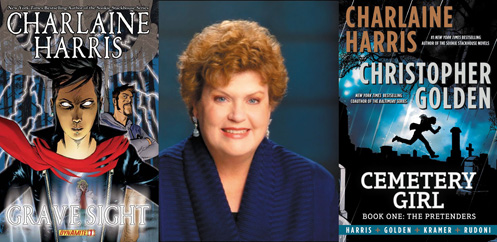 |
AUTHOR: The Sookie Stackhouse Mysteries (True Blood), The Harper Connelly Mysteries
PREVIEWSworld: Please tell us a bit about yourself?
Charlaine Harris: I am a daughter of the South, and now live in Texas. I have a husband, three adult children, two grandchildren, and some rescue dogs. My first book was published in 1981. Since then, I’ve written mysteries, urban fantasy, science fiction, and even a little romance. I like to keep my brain moving.
PREVIEWSworld: What are the biggest challenges you faced when you transitioned from a prose writer to comics?
Charlaine Harris: I was accustomed to describing, which is not the writer’s job in graphic novels. I had to learn a very hard lesson; you can’t write transitions. Each panel is a particular action. Chris Golden (artist of Cemetery Girl) kept telling me, “You can’t write something the artist can’t draw.” It finally penetrated. It was also hard to learn that the artist has the power to make a character look the way he/she sees the character, which is not necessarily the way the writer sees the character.
PREVIEWSworld: What projects would you like to see make the jump from prose to comics?
Charlaine Harris: That’s an interesting question. I’d really enjoy seeing Jeanne Stein’s Anna Strong books in graphic form. Kevin Hearne’s Iron Druid books! That would be great! And here’s a book that would be a PERFECT graphic novel: Lila Bowen’s Wake of Vultures.
PETER DAVID
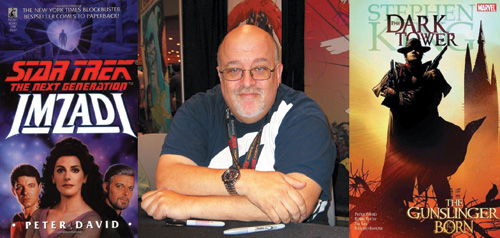 |
AUTHOR: Award-wining “Writer of Stuff”… including Comics, Novels, and Television
PREVIEWSworld: Please tell us a bit about yourself?
Peter David: Well, I tend to bill myself as a "writer of stuff" because I've written so many stories covering so many formats that it's hard to feel pegged into just one! I've been writing comic books since the mid-1980s, and I've also had over a hundred novels published. I've won awards including the Eisner and the Julie award, and I've had a number of books on the New York Times Bestsellers list. Currently my regular assignments are Spider-Man 2099 and Stephen King's Dark Tower at Marvel.
PREVIEWSworld: What are the biggest challenges you faced when translating prose stories and writing habits to comic format?
Peter David: Actually this one, Artful (Action Lab Entertainment), presented no challenge at all. I had written a screenplay version of the novel just because I thought it would be a good idea to do so just in case anyone was interested in the movie rights. So when I was approached about the notion of turning it into a comic book, I simply gave them the screenplay and said, "Here you go." The artist took it from there, and I think she's done a wonderful job.
PREVIEWSworld: What projects would you like to see make the jump from prose to comics?
Peter David: I wouldn't mind seeing Tigerheart, and its sequel, Fearless, as comics. I think they'd make great projects.
S.A. CHECK
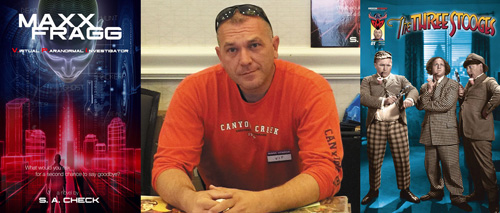 |
AUTHOR: Maxx Fragg V.P.I., Welcome to Greengrass, Pink Panther, The Three Stooges
PREVIEWSworld: Please tell us a bit about yourself?
S.A. Check: Hi! I’m S.A. Check, a YA and Sci-fi fantasy novelist, and comic book writer. I’ve been a fan of comics ever since I was 11 years old, buying my first 22 pages of literary gold off a rotating metal rack in the lawn and garden section of our local grocery store. Ever since then, I’ve been hooked, spending many of my formative years collecting comics, either off the rack, at conventions, maybe even from the back of a van at local flea markets (KIDS – DON’T TRY THAT AT HOME!). Along with the comics I’ve amassed, I also became an avid reader of novels, devouring pretty much anything I could get my hands on from science fiction, to adventure, westerns, Which-Way? books, and even some classics. Getting lost in the worlds of Asprin, Pratchett, Asimov, and Bradbury, I began creating my own stories. Reading comics, I inadvertently learned along the way about story arcs and conflict, dialogue and drama.
My first novel, Welcome to GreenGrass, is an adventure book that mashes together elements of magic, mystery, and science fiction, published by Necro Publications/Bedlam Press. I’ve also contributed short stories for anthology works, written for Bleeding Cool Magazine, and released a second novel, Maxx Fragg, V.P.I., a para-cyber fantasy from Ink Smith Press. Currently, I’m working as an editor and writer for American Mythology Productions where I’m writing for The Three Stooges and Pink Panther comics, with a number of other projects in the works for the company. This September, AM will release my political parody Red White & Stooge, and in November, several of my shorts will be included in the Pink Panther trade paperback, also from American Mythology. So, from a kid who grew up on comics, to an adult who gets to write them, not too shabby of a ride if I do say so myself.
PREVIEWSworld: What are the biggest challenges you faced when translating prose stories and writing habits to comic format?
S.A. Check: There are several challenges to writing for comics as opposed to straight prose. With novels and short stories, there are always elements that you can leave to the reader’s imagination in your work. You set the stage, but the nuances can be filled in with certain scenes, which allows for different interpretations of the same work. The reader brings their own life experiences and expectations with them when they read one of my novels. With comics, being such a visual media, your vision of the scenes and panels have to really be spot on to stay true to where you’re taking the story. The scripts for a comic are a blend of setting the scene right and then following through with the words. One of the things I’ve always enjoyed about comics is being able to connect with readers by using a combination of dialogue, captions, panel placement, even sound effects. Working with the right artist, like Adrian Ropp, Bill Galvan, Brendon and Brian Fraim, and many of the other talented folks I’ve collaborated with for American Mythology, has been nothing short of awesome, because each of these guys brings so much to the stories, taking them to a whole new level. Seeing one of my novels in print is always gratifying, but seeing your vision come to life on the paneled page is definitely something special.
PREVIEWSworld: What projects would you like to see make the jump from prose to comics?
S.A. Check: I think my writing, whether it’s prose or not, has always been heavily influenced by the mounds of comics I read growing up. Welcome to GreenGrass is based on a reluctant hero who finds himself trapped in the alien city of GreenGrass, surrounded by an impenetrable dome, and forced to live amongst a colorful mix of alien races. Between the scenery and characters, it would make a fun romp as a comic. Maxx Fragg, V.P.I. blends the supernatural with the cyber and would also lend to some cool designs, especially the scenes inside the virtual city of Other Syde, where a large part of the book takes place. It’s really a dynamic time for media with books, comics, the internet, TV, and movies, and the way properties cross seamlessly into each of them. I’m in a fortunate place right now where I’m able to do both print novels and comics and work with some incredibly talented people along the way.




